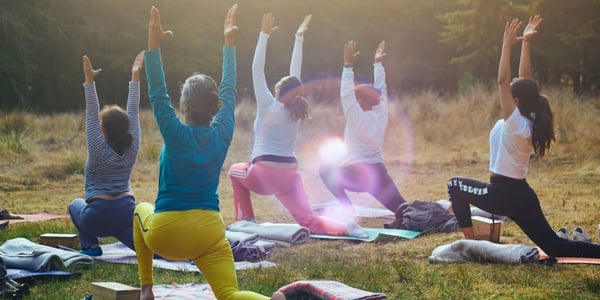Pilates, named after the creator, Joseph Pilates, is an exercise routine that focuses on creating...
10 Benefits of Pilates for Older Adults
Pilates has become increasingly popular among adults of all ages, and for good reason. This low-impact exercise method offers numerous benefits for physical and mental well-being. Let's explore ten key advantages of incorporating Pilates into your fitness routine.
1. Improved Core Strength and Stability
Pilates focuses on strengthening the core muscles, which include the abdomen, lower back, and thighs. A strong core is essential for maintaining good posture, reducing back pain, and improving overall stability. Engaging these muscles through controlled movements helps Pilates develop a powerful center that supports the entire body.
With a stronger core, you'll find it easier to perform everyday tasks like lifting groceries, getting up from a chair, or reaching for objects on high shelves. This increased strength can lead to greater independence and confidence in daily activities.
Pilates exercises often target the deep abdominal muscles, including the transverse abdominis, which acts as a natural corset for the body. Strengthening these muscles can lead to a flatter stomach and improved overall posture.
2. Better Balance and Coordination
Pilates's most significant benefit is its ability to enhance balance and coordination. The exercises challenge the body to maintain stability while performing precise movements, which can improve proprioception (awareness of body position) and reduce the risk of falls.
Regular Pilates practice can help decrease the likelihood of falls, a common concern as we age. By improving balance and body awareness, you'll feel more confident in your movements during exercise and daily life.
Pilates incorporates exercises that require focus and concentration, which can help improve overall coordination. This enhanced coordination can translate to better performance in other physical activities and sports.
3. Increased Flexibility and Range of Motion
Pilates incorporates stretching and controlled movements that can significantly improve flexibility and range of motion. This increased flexibility can help alleviate stiffness, reduce the risk of injury, and make everyday activities more comfortable.
Improved flexibility can also contribute to better joint health, potentially reducing discomfort associated with conditions like arthritis. Pilates gently moves joints through their full range of motion, helping maintain and even improve joint flexibility.
The focus on stretching in Pilates is not just about achieving impressive poses; it's about functional flexibility that allows for more effortless movement in daily life. This can include activities like reaching for items on high shelves, tying shoelaces, or getting in and out of a car with greater ease.
4. Enhanced Posture and Spinal Alignment
Poor posture can lead to many problems, including back pain, neck strain, and reduced mobility. Pilates emphasizes proper alignment and body awareness, helping to correct postural imbalances and promote a more upright stance.
Better posture improves appearance, prevents chronic pain, and reduces the risk of spinal issues in the future. Good posture allows the lungs to expand more fully, contributing to better breathing.
Pilates exercises often focus on spinal articulation, which can help improve spinal mobility. This can reduce back pain and improve overall spinal health.
5. Increased Muscular Strength and Endurance
While Pilates is not primarily a strength-training method, it does help build lean muscle mass and improve muscular endurance. The exercises often use body weight or light resistance, making them accessible to people of various fitness levels.
The strength gained through Pilates translates well to everyday activities, helping you maintain independence and vitality. This functional strength is particularly beneficial for tasks that require sustained effort, such as gardening or household chores.
Pilates also emphasizes balanced muscle development, which can help prevent injuries caused by muscular imbalances. This approach ensures that both larger and smaller muscle groups are strengthened proportionally.
6. Improved Breathing and Lung Capacity
Proper breathing is a fundamental principle of Pilates. The practice emphasizes deep, controlled breathing that can enhance lung capacity and improve overall respiratory function.
Focused breathing techniques learned in Pilates can also be applied outside of class to manage stress and promote relaxation. This can be particularly beneficial in stressful situations or when trying to fall asleep at night.
Improved breathing patterns can lead to better oxygenation of the blood, which can contribute to increased energy levels and improved overall health. Deep breathing exercises in Pilates can also help strengthen the diaphragm and intercostal muscles, leading to more efficient breathing in daily life.
7. Enhanced Mind-Body Connection
Pilates is a mind-body exercise that requires concentration and awareness. Focusing on the connection between mind and body can improve cognitive function and promote a greater sense of overall well-being.
The mindful nature of Pilates can help clear mental fog and improve focus in other areas of life. Practicing mindfulness during Pilates sessions makes it easier to stay present and focused in your daily activities.
The concentration required in Pilates can also serve as a form of moving meditation, providing a mental break from daily stressors and promoting a sense of calm and relaxation.
8. Better Quality of Life and Emotional Well-being
Studies have shown that regular Pilates practice can improve quality of life, mood, and emotional well-being. Combining physical activity, mindfulness, and social interaction in group classes can contribute to a more positive outlook on life.
Exercise, including Pilates, has been shown to release endorphins, which can help alleviate symptoms of depression and anxiety. The sense of accomplishment from mastering new Pilates exercises can also boost self-esteem and confidence.
Pilates classes can provide a supportive social environment, which can be particularly beneficial for those who may feel isolated. The sense of community in a Pilates class can lead to new friendships and a stronger support network.
9. Improved Sleep Quality
Regular physical activity, such as Pilates, can contribute to better sleep quality. Combining physical exertion and stress reduction can help you fall asleep faster and enjoy more restful sleep.
Improved sleep quality can increase energy and alertness during the day, enhancing overall quality of life. Better sleep can also improve cognitive function, mood regulation, and physical recovery.
The relaxation techniques learned in Pilates, such as controlled breathing and body awareness, can be applied at bedtime to help calm the mind and prepare the body for sleep.
10. Low-Impact Exercise Option
Pilates is a gentle, low-impact form of exercise that is easy on the joints, making it an excellent option for those concerned about high-impact activities or recovering from injuries.
Pilates can be modified to accommodate various fitness levels and physical limitations, making it accessible to a wide range of individuals. This adaptability ensures that you can continue practicing Pilates even as your fitness level or physical condition changes over time.
The low-impact nature of Pilates makes it an excellent complement to higher-impact activities, allowing for consistent exercise without overstraining the body.
Getting Started with Pilates
If you're interested in experiencing these benefits for yourself, here are some tips for getting started with Pilates:
- Consult your healthcare provider: Before beginning any new exercise program, it's always wise to check with your doctor, especially if you have any existing health conditions.
- Find a qualified instructor: Look for a certified Pilates instructor with experience working with individuals in your age group. They can help ensure proper form and provide modifications as needed.
- Start with beginner classes: Even if you're generally fit, it's best to begin with beginner-level Pilates classes to learn the fundamental principles and movements.
- Choose the right type of Pilates: There are various forms of Pilates, including mat-based and equipment-based (using machines like the Reformer). Mat Pilates is often a good starting point for beginners.
- Be consistent: Aim to practice Pilates at least twice a week to see noticeable improvements in strength, flexibility, and overall well-being.
- Listen to your body: While some discomfort is normal when starting a new exercise routine, never push through pain. Communicate with your instructor if you need modifications.
- Combine with other activities: While Pilates offers numerous benefits, it's best to combine it with other forms of exercise, such as walking or swimming, for a well-rounded fitness program.
- Invest in proper equipment: If you're practicing at home, consider investing in a quality mat and any small props recommended by your instructor, such as resistance bands or small balls.
- Set realistic goals: Remember that progress in Pilates is often gradual. Set realistic goals for yourself and celebrate small improvements along the way.
- Practice patience: Like any new skill, Pilates takes time to master. Be patient with yourself and enjoy the journey of learning and improving.
Click here or the button below to subscribe to our blog!
Pilates offers a transformative journey of physical and mental well-being. It's about reconnecting with your body, improving daily life, and feeling more confident. Pilates can be the answer whether you're seeking to ease aches, boost energy, or find enjoyable exercise.
It's not a quick fix but a journey that requires patience and consistency. The beauty lies in the practice itself – showing up for yourself and giving your body the care it deserves.
So, why not give it a try? Find a class, roll out a mat, or start with simple breathing exercises. Your body will thank you. It's never too late to start taking care of yourself in new ways. Pilates is an investment in yourself, and that's always worth it.







